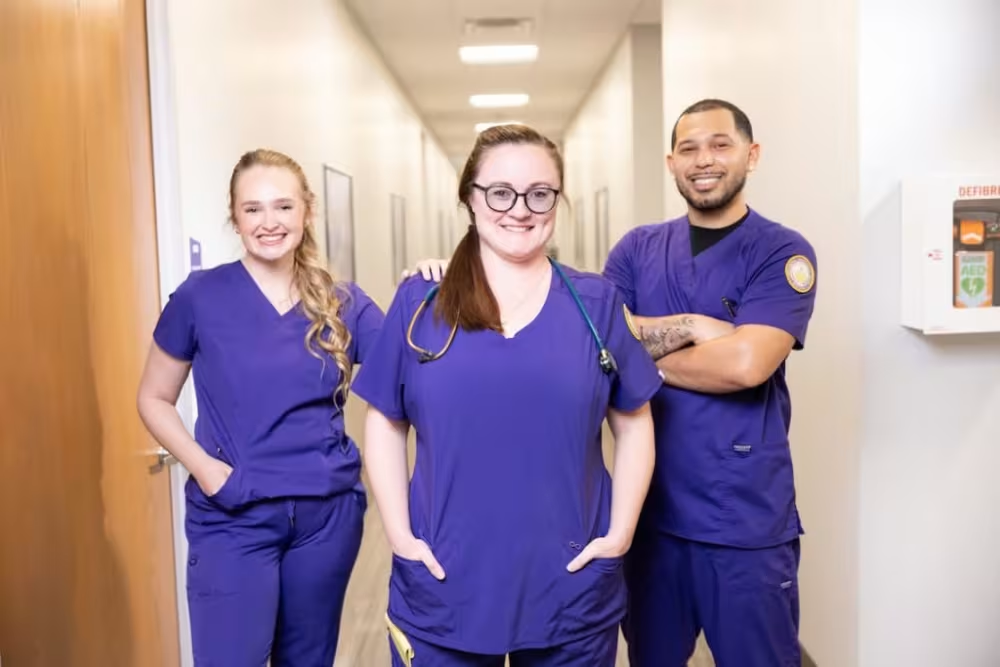Exploring the Roles of a Registered Nurse
The decision to become a registered nurse (RN) is one that can change your life. It can give you the opportunity to earn a respectable […]
Each blog post is dated and contains accurate information as of that date. Certain information may have changed since the blog post publication date. If you would like to confirm the current accuracy of blog information, please visit our ABSN overview page or contact admissions at (866) 891-1371.
What do nurses do? There are many roles of a registered nurse, depending on the nursing specialty. For example, oncology nurses provide both nursing care and compassionate emotional support, while nurse educators instruct nursing students. In general, RNs administer medications, provide wound care, develop care plans, and provide patient education.

The decision to become a registered nurse (RN) is one that can change your life. It can give you the opportunity to earn a respectable salary while enjoying career versatility and advancement possibilities. What do nurses do, and could it be the right career for you?
An RN wears many hats: patient advocate, educator, and compassionate listener, just to name a few. The specific roles you might step into depend largely on your choice of nursing specialty and your level of nursing.
No matter which nursing specialty you pursue or where your career takes you, you can build a strong foundation for your future at Concordia University Texas. Our Accelerated Bachelor of Science in Nursing (ABSN) track allows you to earn a Bachelor of Science in Nursing (BSN) in as few as 16 months upon the successful completion of prerequisites. You’ll learn all about nursing responsibilities and skills, and gain clinical experience in local healthcare facilities.
Before becoming a nurse, take some time to learn about the general responsibilities of what nurses do and discover the answer to the question, “What does a registered nurse do in different specialty areas?”
What Do Registered Nurses Do?
The nursing profession centers on providing care and support to patients to help them heal from diseases and injuries or manage chronic conditions. Nurses are primarily caregivers, but they also fulfill many other roles.
What do nurses do beyond providing care? They advocate for their patients, helping them connect to needed community resources. They serve as educators, instructing patients in how to care for themselves after discharge. They also provide emotional comfort to those in distressing situations and help patients navigate a healthcare system that can sometimes be confusing.
What Does a Nurse Do? Core Responsibilities Across the Board
While nursing responsibilities vary from one specialty to the next, there are some commonalities. For example, nurses often perform patient assessments and develop nursing diagnoses. They can also:
- Administer medications and other treatments
- Deliver patient and family caregiver education
- Develop nursing care plans
- Document patient medical histories, symptoms, and care
- Perform diagnostic tests
- Operate medical equipment
- Perform wound care

Types of Nurses and What They Do
Nursing responsibilities depend on the level of nursing and the nursing specialty. For example, an LPN has different responsibilities than an N, even if they work in the same setting.
Licensed Practical Nurse (LPN)
An LPN works under the supervision of an RN and other healthcare providers. On the levels of nursing, they are one step below an RN. LPNs provide basic nursing care to patients. They document patient concerns, monitor vital signs, and relay any issues to RNs. They also provide basic wound care.
Much of an LPN’s job, however, centers on assisting patients with the activities of daily living (ADLs). These include bathing, grooming, dressing, feeding, and helping patients with mobilization.
Advanced Practice Registered Nurse (APRN)
An APRN is at the top of the levels of nursing. They practice with greater autonomy than RNs, with a broader scope of responsibility and, in some cases, prescribing authority. An APRN serves as a nurse leader and mentor.
The four main types of APRNs are:
- Clinical nurse specialist (CNS)
- Nurse practitioner (NP)
- Certified registered nurse anesthetist (CRNA)
- Certified nurse midwife (CNM)
Responsibilities vary depending on specialty. For example, CRNAs administer anesthesia, while CNMs provide reproductive care.

Do you want to advance your career as a registered nurse? Learn more about becoming an advanced practice registered nurse.
Urgent Care Nurse
Urgent care centers are freestanding facilities that see patients who have urgent or serious acute medical conditions or acute complications of chronic conditions. They do not treat patients with life-threatening conditions, however, such as a stroke.
If you decide to pursue work as an urgent care nurse, you can expect a fast-paced environment and an unpredictable routine. The types of cases you’ll see will vary on a day-to-day basis, ranging from skin rashes and upper respiratory infections to sprains and fractures.
Critical Care Nurse
Critical care nurses, or ICU nurses, work in intensive care units (ICUs). ICU nurses care for patients who are recovering from life-threatening conditions, ranging from cardiopulmonary events to organ transplant surgeries and traumatic burn injuries.
Oncology Nurse
An oncology nurse cares for patients with cancer. Some oncology nurses choose a subspecialty, such as pediatric oncology. Oncology nurses may contribute to and implement treatment plans, coordinate care among specialists, and administer medications.
Although it’s important for all nurses to be excellent communicators who respond empathetically to their patients, these attributes are particularly crucial for oncology nurses. Their patients are facing significant challenges, so a compassionate ear is a must-have.
Health Coach and Care Planner
You can use your nursing degree to help patients far beyond the bedside. Some BSN-prepared nurses who want to move out of the clinical setting can start their own businesses as health coaches or care planners.
After education and certification, health coaches and care planners may be hired by insurers and companies to help their workers and customers minimize their need for medical intervention and lower healthcare costs. They can also assist patients with chronic illnesses as they plan for their long-term care needs.
Nurse Navigator
Like a care planner, a nurse navigator helps patients with long-term illnesses sort through their insurance eligibility to find the best, most affordable care. You may only work for a few hours per patient, but your insider knowledge of the hospital industry and insurance can help save your clients hundreds of thousands of dollars, depending on their care needs and insurance options.
Hospice Nurse
Sometimes, the roles of a registered nurse do not involve working toward curative patient care. Comfort care or palliative care is all that nurses can offer to some patients. This is the case for hospice nurses.
Hospice nurses work for services that specialize in end-of-life care, either in hospice facilities or in the home. Your primary work will be alleviating pain and discomfort for the patient in your care and providing emotional and spiritual support for your patient and their family. Hospice nursing might also require some travel if you choose to do in-home care.
Public Health Nurse
Public health nurses (PHNs) are typically employed by state, public, or government entities. They focus on the overall health of the community. As a PHN, you may work on everything from immunization campaigns to smoking cessation initiatives or maternal health programs. Public health nurses also track health data in a population, identifying trends and advocating for resources.
Occupational Nurse
Occupational nurses are usually employed by businesses’ in-house nurses for their employees, especially in manufacturing jobs where workers encounter dangerous machinery on a regular basis.
Unlike many of these other jobs, taking a job as an occupational nurse will not likely require you to get much outside training besides your BSN degree, though each place of employment may have different requirements.
Take a deeper dive into career possibilities by exploring 21 nursing specialties

Dialysis Nurse
Dialysis is a life-sustaining treatment for patients with severe kidney disease. It is often provided in clinical locations but may sometimes also be available in the patient’s home. Dialysis nurses administer medications, oversee the dialysis treatment, and educate patients about their condition.
Nurse Educator
All nurses are patient educators, but some decide to take it a step further by becoming nurse educators. A nurse educator is an instructor at a nursing school. These professionals can teach at community colleges, universities, teaching hospitals, and other types of nursing schools.
A Master of Science in Nursing (MSN) and/or a nurse educator certification are the minimum requirements to teach nursing students, although you may need a Doctor of Nursing Practice (DNP) for advanced positions.
Are You Ready to Pursue RN Careers?
The Concordia University Texas ABSN track provides a pathway to many opportunities in nursing for students with a non-nursing bachelor’s degree or at least 60 college credits. Through comprehensive coursework, nursing, and clinical rotations, students can earn their BSN in as few as 16 months after completing prerequisites. Our nursing school offers Academic Success Coaches to support you along the way.
Contact an admissions counselor today and start pursuing an exciting career in nursing.
